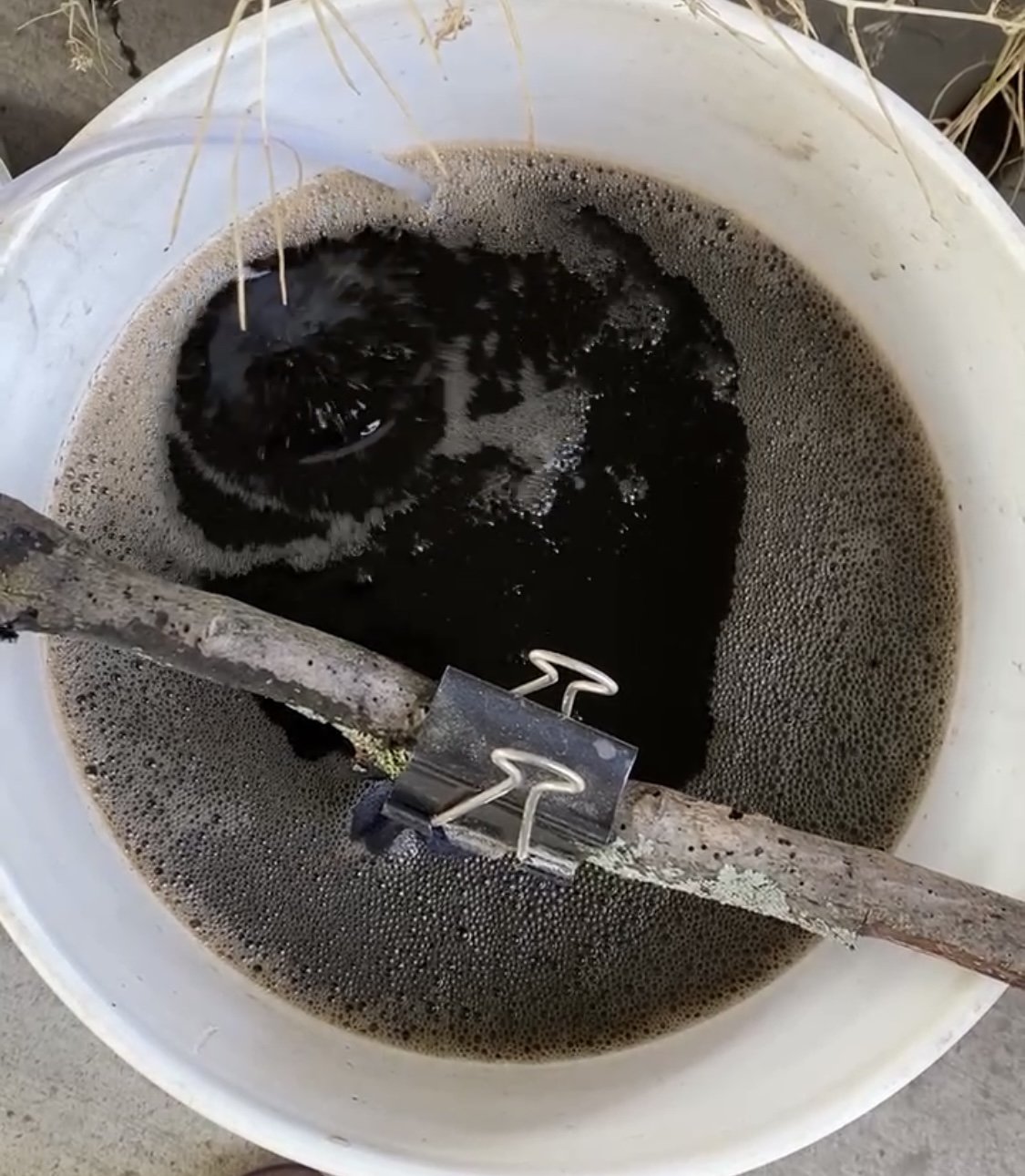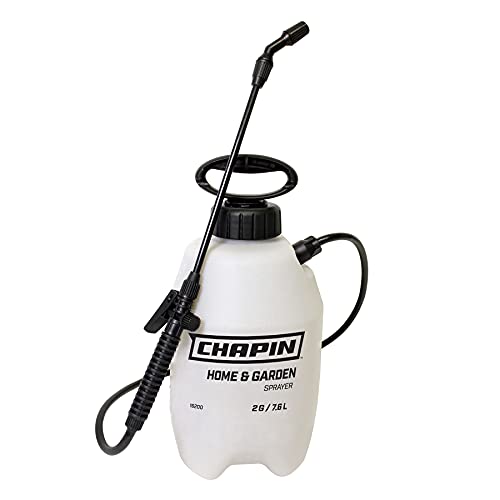How to Make Compost Tea
Compost tea in the making.
April 19, 2024
On our 1-acre flower farm, we use organic and regenerative growing practices to build soil health to grow the most gorgeous flowers and foliage for our cut flower business. Every season, we get our soil tested to understand which minerals and nutrients need attention so we don’t over- or under-fertilize. All of the inputs (fertilizers and soil amendments) we use on our farm are organically derived and do not contain any harmful or harsh chemicals.
Here is a great article about the soil amendments and fertilizers we use on our flower farm, if you’re interested.
Our own, homemade Compost Tea is the one input we use on a schedule throughout the growing season to ensure healthy plant growth.
what is compost tea and why use it?
Compost Tea is exactly what it sounds like — it is a liquid infusion of compost in water that has been continually aerated, usually in a 5 gallon bucket, for a few days. Once finished, compost tea is filled with beneficial microbiology, which originally came from the compost itself. The microbial populations explode when they are continually aerated with a bubbler.
The finished Compost Tea acts as a vehicle for getting all of these valuable bacterial and fungal microbes into your garden or farm by either spraying or drenching the tea onto your plants and garden beds. I’ll explain how we make our compost tea and how we use it in more detail below.
Related: 5 Steps to Building Healthy Organic Garden Soil
the importance of using good compost
The quality of your Compost Tea is directly relational to the quality of your ingredients. It’s just like baking a cake. Low-quality compost will yield low-quality compost tea. So it’s important that you either make your own compost or source it from somewhere you know has good compost practices. I would not recommend buying most bagged compost from garden centers, unless it is labeled as organic with the OMRI certification. If you are unable to make your own compost and want to buy bagged compost, I would recommend this organic brand.
Related: Outsourcing Compost and the Risks Involved
what is compost tea good for?
Compost Tea can be used on any living plant — veggies, herbs, flowers, trees, shrubs, even your lawn. By spraying or drenching compost tea onto the plants in your outdoor space, you’ll add tons of invisible bacterial and fungal life to your outdoor space. Healthy bacteria and fungi help with fighting plant diseases and pathogens, and it may even help deter bugs from eating your plants by raising the Brix levels present in plant sap. High Brix levels make plants unpalatable to insects — for more information, Nigel Palmer’s book is an amazing resource: The Regenerative Grower’s Guide to Garden Amendments.
Our compost tea bubbling away — sock filled with compost.
Our Recipe for Amazing Compost Tea
When I make compost tea, I blend other amendments into it for maximum effect. I figure if I’m already spraying the compost tea, I might as well add other organic fertilizer into it so I don’t have to spray twice — efficiency is key when running a farm!
Tools and Ingredients needed for making Compost Tea:
Please realize that you will only have to buy most of this stuff once, except the sock/pantyhose.
5-gallon bucket filled 3/4 full with water (does not need to be a food grade bucket)
Aquarium bubbler kit — I use this exact one
An old sock or pantyhose
A stick or piece of wood long enough to sit across the top of the bucket + 1 chip clip, binder clip or clamp
Compost - 2 cups
Liquid Humate/Humic Acid - 2 tbsp (Humate is food for microbes and helps with water retention)
Liquid Fish Emulsion - 2 tbsp (Liquid fish is an all-purpose organic fertilizer)
Unsulfered Blackstrap Molasses - 2 tbsp (Molasses provides a sugar source for microbes)
A note on timing: I make compost tea when outside temperatures are at least 60 degrees consistently, including nighttime lows. If it’s cold out, the biology won’t be as active. I usually start making compost tea in mid-May in my zone 6b.
A note on water: The water in your bucket could either be saved rainwater (the best water) or maybe you filled the bucket with municipal water. Either type of water works, but the municipal water will need to sit out in the sun for an entire day before you can start making compost tea — this will off-gas any chemicals/chlorine in the water that is harmful to microbiology. Rainwater is perfectly fine to use as-is.
Now we’re going to make compost tea… Set yourself up in an area that is outdoors but covered (a porch or garage is a great spot). You’ll need to be by an outlet to plug your bubbler in, or run an extension cord.
Fill your old sock or pantyhose with the compost. Tie the sock in a knot.
Attach the sock to the middle of your stick using your chip clip, binder clip or clamp.
Suspend the stick over the open bucket of water so the sock full of compost falls down into the middle of the water.
Add the Fish Emulsion, Humate and Unsulfered Blackstrap Molasses to the water. No need to mix it up, the bubbler will do that for you.
Put your bubbler together. Drop the stone end into the bucket so it touches the bottom. Turn the bubbler on and leave it on for 3-5 days, depending on the outdoor temperature. Hotter temperature will require less time.
After bubbling for 3-5 days, your compost tea is ready to use! I use 1 cup of tea per gallon of rainwater. It is important to save rainwater for this, otherwise the chemicals present in municipal water may kill off your beneficial bacteria and fungi you worked so hard to grow.
Strain the tea through the sieve into your garden sprayer or backpack sprayer. I use a 4.5 gallon backpack sprayer because I have a lot of ground to cover on my flower farm. A hand sprayer works just fine for yards and smaller spaces.
When is compost tea ready?
Your compost tea will be ready after 3-5 days if prepared using the steps above. It will not smell bad. It will not have enough time to attract bugs. Mosquitoes will not have had enough time to lay eggs in it; since it is bubbling, they wouldn’t do that anyway.
how to apply compost tea?
You can either spray or drench with compost tea. When spraying plants directly, make sure to do this when the sun is down and there is no immediate rain in the forecast. I prefer to spray in the evenings when the sun is going down.
Drenching with compost tea means you add compost tea to a watering can (1 cup of tea per 1 gallon of water) and water your plants with it. Sometimes I drench with half compost tea/half water, for heavy feeders like roses and other flowering shrubs.
You can also spray your garden beds with compost tea to infuse the beds with tons of microbiology. The microbes will help wake the bed up before planting and will get nutrient cycling going. I spray my beds before planting annuals, and I spray the soil underneath my perennials in the spring as well.
Related: How to Start a No-Till Sheet Mulch Garden
Will compost tea burn plants?
When diluted to 1 cup tea per 1 gallon of water, I have never had this compost tea burn any plants. I have never had it burn plants even when I directly watered it into my rose patch with no dilution.
does compost tea go bad?
Compost tea is only as good as the microbiology living in it. If it’s sitting around for weeks on end, it could lose its vigor, or become anaerobic if you do not keep it bubbling. That said, your compost tea should be used fresh, within a few days of making it.
Related: How to Fix Soil After Using Miracle-Gro and Other Chemical Fertilizers
how often to apply compost tea?
In the Spring of every season, I spray compost tea on our entire flower farm — soil and existing perennial plants — when the weather starts warming up. This application of compost tea helps add tons of microbial life to our farm to help wake up the beds.
During the season, I spray compost tea once every two weeks on our annuals, once they are planted. I only spray through July because when growing cut flowers, they cannot be covered in compost tea. For a backyard, I would recommend once per month for healthy plants.
If you want to spray your lawn with compost tea, I recommend spraying it once in the spring and once in the fall.
Related: Using Silage Tarps to Kill Weeds
Where to buy compost tea?
If after reading this you are still not convinced you want to make your own compost tea, you could buy it from this retailer on Amazon here. Storebought compost tea is not as fresh as your own, homemade tea would be, and I cannot guarantee the results will be as good, but it is certainly worth a shot!










